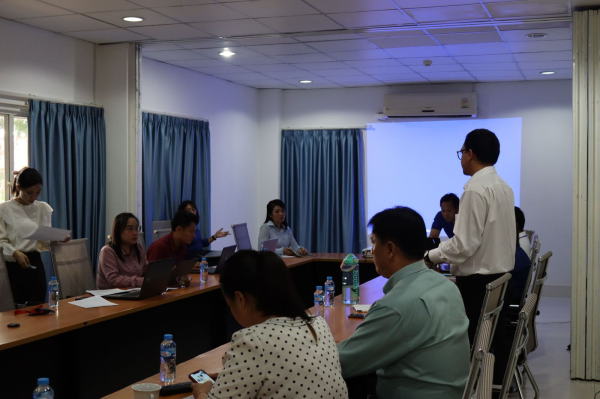KPL
(KPL)The Food and Agriculture Organization of the United Nations (FAO) supported the refresher training course on the application of the WHONET program for antimicrobial resistance (AMR) surveillance data management in the animal health sector in the Lao PDR. The training was held between July 31 and 4 August 2023 for the National Animal Health Laboratory (NAHL) of the Department of Livestock and Fisheries.

(KPL)The Food and Agriculture Organization of the United Nations (FAO) supported the refresher training course on the application of the WHONET program for antimicrobial resistance (AMR) surveillance data management in the animal health sector in the Lao PDR. The training was held between July 31 and 4 August 2023 for the National Animal Health Laboratory (NAHL) of the Department of Livestock and Fisheries.
The work on AMR surveillance and monitoring in animals in Lao PDR has been conducted jointly and constantly between the Department of Livestock and Fisheries of the Ministry of Agriculture and Forestry, and FAO through its Emergency Centre for Transboundary Animal Diseases (ECTAD).
Since 2018, the work was financially supported by the United Kingdom Agency for International Development (UK Aid) through the Fleming Fund. To strengthen the AMR surveillance and its monitoring, the fund was also used to build capacity of NAHL and its networks in the areas of proper field sampling, proper sample handling, enhancing diagnostic test capacity for bacterial culture and identification, performing antimicrobial susceptibility test (AST), and AMR data management. To ensure accurate results and good AMR surveillance data management, the WHONET program, which is crucial for the user in the animal health sector, was applied with proper training provided.

During the opening remarks, Ms. Oanh Nguyen Phuong, International Operations Specialist, FAO Representation in Lao PDR, highlighted the importance of data management in AMR surveillance in food producing animals for appropriate preventive measures and policy recommendations. She also emphasized that capacity to properly manage data and proficient use of WHONET software is critical to ensure the effectiveness of AMR surveillance in animal health sector.
Dr. Souphavanh Keovilay, the Deputy Director General of the Department of Livestock and Fisheries, expressed his sincere thanks to FAO for their kind support and assistance to provide the WHONET refresher training course. He said the training aimed at improving the knowledge and skills of the staffs involved in the data management, especially when new staff were recruited to maintain the AMR data management. It also provided the ground for integrating existing methods for keeping record of the laboratory diagnostic data towards improving general laboratory information management system at the National Animal Health Laboratory of the Department of Livestock and Fisheries.
The refresher training course on the application of the WHONET program for AMR surveillance data management in the animal health sector in Lao PDR was conducted as part of the project GCP/GLO/1092/UK entitled “Engaging the food and agriculture sector in Sub-Saharan Africa, and South and Southeast Asia to generate data-for-action to combat antimicrobial resistance using a One Health approach”, funded by the UK Fleming Fund. The training was delivered by the trainers from the National Centre for Laboratory and Epidemiology (NCLE) of the Ministry of Health (MoH). Six trainees attended this refresher training course. They are the NAHL technical staffs, intern students and the technical staff from the Division of Veterinary Services, DLF.
KPL